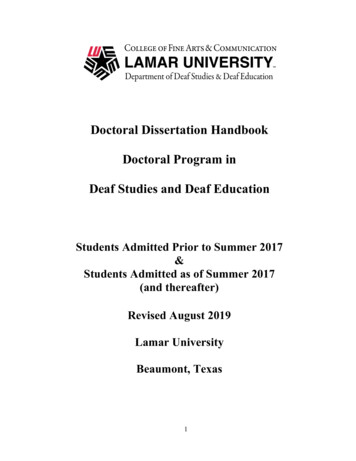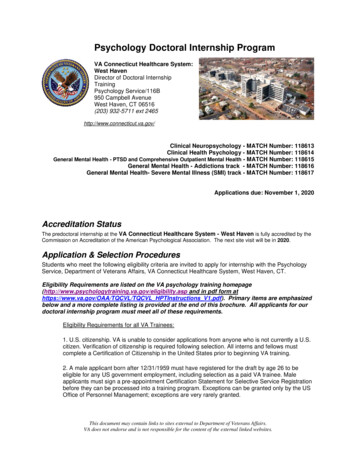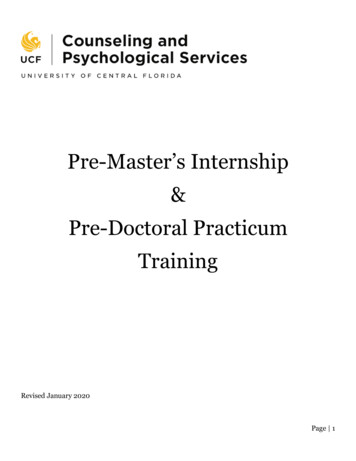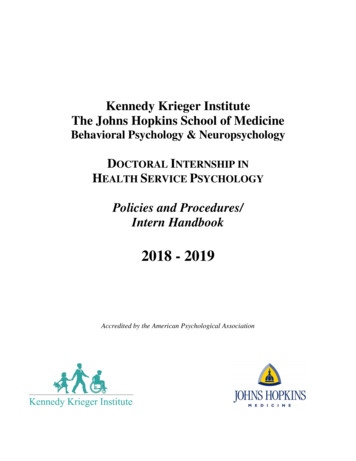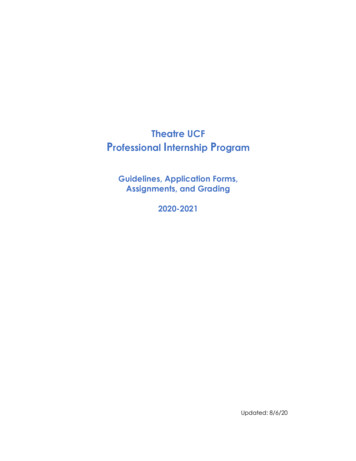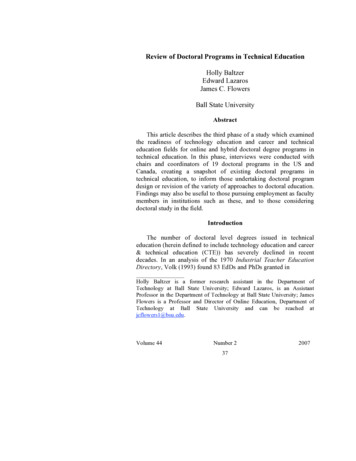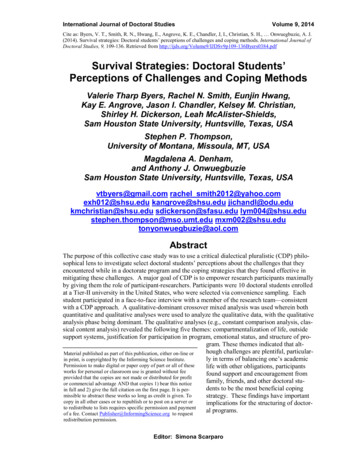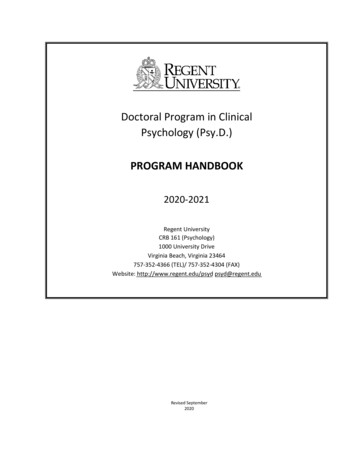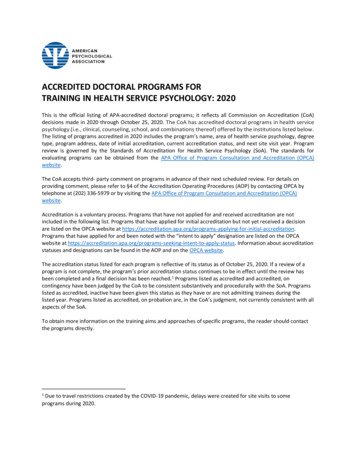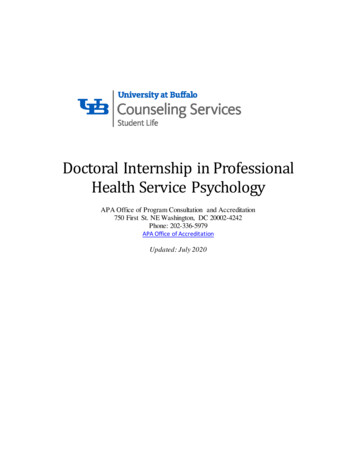
Transcription
Doctoral Internship in ProfessionalHealth Service PsychologyAPA Office of Program Consultation and Accreditation750 First St. NE Washington, DC 20002-4242Phone: 202-336-5979APA Office of AccreditationUpdated: July 2020
About the University at BuffaloThe University and Its EnvironmentLocated on two spacious, attractive campuses, the University at Buffalo is the largest, mostcomprehensive member of the State University of New York system. It boasts an ethnically andculturally rich and diverse student body of approximately 27,000 students, 19 percent of whomare minority students and 7 percent of whom are international students. The distinguished facultyincludes nationally and internationally recognized figures in all major disciplines. In addition, thepresence of three major coordinating divisions, Undergraduate Education, Graduate andProfessional Education, and the Division of Continuing Education, allows for a variety and scopeof academic programs that is unsurpassed. The quality and extensiveness of the facilities at bothon- and off-campus sites greatly enhance the reputation of the University. As the second largestcity in New York State, Buffalo is proud to be the home of this prestigious institution. Indeed,the University represents a major cultural center for all of Western New York. Films, concerts,art exhibits, and lectures by a wide variety of prominent people are available on campusthroughout the year.Buffalo, New York? Most people think of snow piled as high as people’s roof tops when theythink of Buffalo, NY (and in reality, most winters do not come close to what has been televisedin the news every several years). Buffalo is much more than snow. There has been new energyand investment in building up and revitalizing this “City of Good Neighbors” and surroundingregions.Are you right for Buffalo? Are You Right For Buffalo You Tube VideoTravel Guide: Buffalo-Niagara, New York: Buffalo Travel You Tube VideoWhy UBCS? From an Intern’s Perspective.(Created by one of our psychology interns)Clinic Related Perks Ability to supervise a doctoral student both semestersAbility to supervise in many contexts (e.g., formally, through consultation, outreach)Paid formal training (e.g., DBT, QPR)Committee involvementGood exposure to diverse clients and especially international studentsStaff engage in peer supervision (exemplifies a training and developmental model)Extra Perks Cost of living Large windows in intern offices
Parking is free and close Insuranceo Free life, vision, and dental insurance (for you, spouse and dependents)o Option of NYS insuranceTo describe the feel of the center: Many people have lunch with each other Birthday club (choice to be randomly assigned staff/psych intern and be responsible for remindingstaff about that individual’s birthday as well as bringing in a dessert treat on or around theindividual’s birthday. Psych interns are celebrated but do not have to organize anything) Sunshine club Staff seems to have good work-life balanceWhy Buffalo?Sites and AttractionsAlbright-Knox Art GalleryBills (NFL)Buffalo and Erie County Botanical GardensBuffalo and Erie County Naval & Military ParkBuffalo Museum of ScienceBuffalo ZooCanadaCanalsideCasino Seneca Buffalo Creek CasinoHoliday valleyKleinhan’s Museum HallNiagara Falls and hiking options (e.g., Devil’s hole)RiverworksSabres Hockey (NHL)Seneca Niagara Resort and CasinoFestivalsAllenton Art FestivalElmwood Avenue Festival of the ArtsErie County FairItalian Heritage FestivalJuneteenth FestivalNational Buffalo Wing FestivalNiagara County Peach FestivalTonawanda Canal Fest
FoodBuffalo food featured on Food NetworkNightlifeLive musicBars and loungesNightclubsParksBuffalo Olmstead Parks ConservancyAmherst State ParkBuffalo Harbor State ParkBird Island PierEllicott Creek ParkBeaver Island State ParkCOUNSELING SERVICES: An OverviewCounseling Services is a department of Student Life. Our office provides a full range of servicesand programs which promotes the personal development and psychological well-being ofstudents and the attainment of personal and educational goals. The staff is strongly committed toprogramming related to student diversity and to an overall university environment whereindividual and cultural differences are celebrated. We also recognize the interconnectedness ofphysical, emotional, and psychological health, and seek to provide services consistent with thisawareness. Among the services offered are individual, couples, and group treatments, crisisintervention, consultation, outreach programming, career counseling, substance abuseassessment, psychological evaluation, and referral. Counseling Services works with studentspresenting with a full spectrum of concerns, from developmental issues to severepsychopathology. Counseling Services also serves students with diverse backgrounds andidentities. The diversity in the clients of the center are comparable or surpass the diversityrepresented at UB (e.g., 17% international students, 45% identifying as an ethnic minority, 23%identifying a non-traditional sexual orientation or gender identity, and 16% identifying as firstgeneration college students).Counseling Services has a staff of 12 full-time licensed or license-eligible psychologists, 4 fulltime licensed social workers, 2 full-time licensed mental health counselors, and a full-timelicensed psychiatric nurse practitioner. In addition to the three full-time doctoral psychologyinterns, there are several part-time trainees. These include social work interns from theUniversity at Buffalo graduate Social Work program, graduate assistants, advanced and first year
practicum students from the University at Buffalo Counseling, School, and EducationalPsychology graduate programs, and externs from graduate programs in counseling or clinicalpsychology, or mental health counseling from other area colleges/universities.Setting and FacilitiesCounseling Services primary offices are located on the North (Amherst) Campus of theUniversity at Buffalo, in a residence hall complex. The facilities include individual offices forinterns, with a large window to let some light in. Each office is also equipped with networkedcomputer equipment, VOIP phones, and webcams for video/audio recording.Group therapy sessions, seminars, and meetings occur in the group room, which is equipped withnetworked computer, webcam for recording, and a Smartboard.There is a satellite Counseling Services office located on the South campus, in the StudentHealth Services building. As Counseling Services as grown, there are as many staff membersprimarily housed in this location as in the original North campus location at this point. DoctoralPsychology Interns’ offices are located in the original North Campus office, where the centerDirector, and the Training Director are also primarily housed. To try to maintain a sense ofoverall cohesiveness among staff and trainees housed in both locations, staff and trainees oftenrotate 1-2 days whole or half-days at their non-primary location; so psychology interns mayspend a day or two at the South Campus location during the week, which allows them greateraccess to the whole staff and potential supervisors. We also have an embedded counselor who
spend 3 days providing services within the Athletics Department, and an embedded counselorwho spends 2 days providing services at the UB Medical campus in the city of Buffalo.Counseling Services has a strong commitment to maintaining close working relationships withother departments of Student Affairs, including Student Health Services, Wellness EducationServices, Disability Services, Career Planning and Placement and the Office of Student Life. Wealso collaborate with other university entities, including the Educational Opportunity Program,the Athletics Department, Office of International Student Services, School of Engineering, andthe Medical School, to name a few.INTERNSHIP: Philosophy & Training ModelThe full-time internship offered by the Counseling Services at the State University of New Yorkat Buffalo is fully accredited by the American Psychological Association (APA Office ofProgram Consultation and Accreditation, 750 First St. NE Washington, DC 20002-4242, Ph 202336-5979, APA Office of Accreditation ).The internship offered by the University at Buffalo Counseling Services (UBCS) is designed toprovide a broad-based professional training experience in the range of activities carried out bypsychologists in a service-oriented university counseling center. We seek to facilitate growthand development in the profession-wide competencies of health services psychology(different from health psychology), as laid out in the Standards of Accreditation (SoA) (APA2015): APA Standards of Accreditation.The goal of internship is to facilitate the development of a well-rounded generalist in theprofession of health service psychology. We utilize a practitioner-scholar model combined withan emphasis on experiential learning. Supervisors provide mentoring based on each intern’sneeds and wants. We recognize that providing developmentally appropriate training andopportunities that take into account individual needs will optimize the internship experience. Wealso recognize the profound impact of individual and cultural difference in all that we do aspsychologists and as human beings. Hence, we have a commitment to diversity and multiculturalawareness in all aspects of our training program.Generalist PerspectiveOur mission is to train interns as skilled generalists equipped to work in a variety of postinternship employment settings. To this end, we provide a range of didactic and experientialtraining activities that psychologists in a large university counseling center setting or othercomparable professional settings are likely to encounter.Practitioner-ScholarOur staff recognizes the importance of clinical practice that is informed by scholarly inquiry, andespouses a practitioner-scholar model in our professional work, including training and service
delivery. Theoretical and research literature is integrated with experiential components oftraining through provision and discussion of professional literature in seminars and supervision.There is recognition of the applicability of scientific method in clinical thinking, includingcritical evaluation, awareness of biases, integration of available information toward hypothesisformation (i.e. case conceptualization), and the process of hypothesis testing (e.g. implementinginterventions, assessing their impact, revising hypotheses). UBCS staff serves as practitionerscholar role models for our trainees, and center activities illustrate the integration of science andpractice. Administrative and policy decisions at our center are informed by scholarly review ofboth empirical and theoretical literature, as well as our center's ongoing examination of serviceutilization, client demographics, and client satisfaction. Results of ongoing satisfaction surveysmay also inform areas in need of attention for clinical staff and trainees.Mentorship and Experiential LearningAs part of the foundation of our training philosophy, mentorship is evidenced by a genuinecommitment to intensive supervision and to the furthering of the intern's personal andprofessional growth. Interns are respectfully regarded as developing professionals and areencouraged to work closely with UBCS staff members, who provide mentoring and serve asprofessional role models for our trainees. Overall, we seek to create an atmosphere of respect andtrust where interns and professional staff support their own and others' growth both personallyand professionally. Staff members model ethical and professional clinical approaches and theyparticipate in teaching through supervision, consultation, and seminars devoted to theprofessional development of interns. Staff members utilize a variety of theoretical orientations inour clinical work, including cognitive, behavioral, feminist, systems, existential, psychodynamic,and solution-focused. Regardless of the primary orientations with which each staff memberidentifies, there is a shared understanding and attention to the therapeutic relationship as a keycomponent and contributor to therapy process and progress. Therefore, interns have theopportunity to get exposure to a variety of therapeutic approaches and styles, while still refiningtheir ability to attend to relational dynamics and use the therapeutic relationship as a primary toolor change mechanismDevelopmental ApproachThere is attention to developmentally appropriate training experiences for optimal growth.Interns' experiences are sequential, cumulative, and graded, with increasing levels ofresponsibility and expectations for independent functioning throughout the internship year, tofacilitate continued growth from a "trainee" identity toward a "professional" identity. Towardthis end, the internship year begins with a period of orientation during which interns receiveseveral seminars providing didactic information on the core tasks that interns will engage inthroughout the year (e.g. short-term therapy, clinical interview, outreach/consultation, grouptherapy, crisis intervention, supervision). Interns also shadow training staff as they conductinitial needs assessments and crisis intervention sessions during their initial orientation period.They also complete a QPR (suicide prevention programming workshop that all staff and internsprovide to the campus community) training, and are required to observe one of the QPRworkshop presentations before they are scheduled to present these themselves. Previous trainingand experience is assessed, initial goals for training are agreed upon, and these training goals are
revised throughout the year based on periodic intern evaluations. Throughout the internship year,support, training, and supervision activities are geared toward assisting interns to increase theirclinical and professional sophistication, knowledge, and skill, be able to take on moreresponsibility, and develop greater confidence and capacity for autonomous functioning.Individualized Training:We recognize that each intern brings a variety of skills, experiences, and training needs to theinternship, and that some flexibility to tailor the training program according to the strengths,needs, and interests of each intern is necessary for optimal growth. This is accomplished innumerous ways, including customizing training contracts for each intern based on their particularinterests and needs, and providing opportunities for intern input into the planning of variouscenter and training activities.Diversity and Multicultural AwarenessUniversity at Buffalo Counseling Services staff and trainees represent a diverse array of racialidentities, cultural identities and sexual orientations. The staff and trainees at CounselingServices are deeply committed to honoring diversity among staff by creating a welcoming andsafe environment that respects difference. Counseling Services staff encourage expression andsharing of identity through various outlets including monthly “Multicultural Moments” wherestaff and trainees share various aspects of their identities during staff meetings.Counseling Services staff model authenticity, openness, and pride in their respective identities.They share freely about themselves and their lives while being curious about each other’sbackground and identities, and how these impact their personal and professional selves.Our internship program attends to diversity/multicultural issues throughout various trainingactivities, including didactic training, supervision, and actual clinical experiences with a diverseclient population. The staff of Counseling Services is committed to the awareness andaffirmation of diversity in all our clinical and professional endeavors. Multicultural awarenessand sensitivity pervade all training and service at our center. The student population here at UBis quite diverse not only among traditionally under-represented American groups, but also amonginternational students. Interns are provided with exposure to clients of differing ethnicities,cultures, sexual orientations, socioeconomic backgrounds, religious backgrounds, ages, genders,and abilities. Several seminars are presented throughout the year addressing various topicsrelated to diversity and multicultural issues. Workshops are provided to the universitycommunity in an effort to assist in the celebration of diversity throughout the campus. We striveto recruit interns who share our commitment to embracing the challenges and rewards of gearingservices to such a broad-ranging population. We are also aware that multicultural factors areinexorably linked with issues of power, privilege, oppression and inequity that exist withinvarious social/economic/political systems. Hence, there is attention to the ways in whichpsychologists and other mental health professionals may incorporate values of social justicewithin their clinical and professional work.
We see the internship year as a transition period when interns will be shifting from a traineeidentity and developing their clinical and professional identities. We seek to assist in thisdevelopmental process by providing interns opportunities to stretch, take risks, try out a varietyof interventions and therapy approaches, and engage in a wide range of professional activities.We hope to assist in their process of discovering their own individual professional identities thatare consistent with their sense of self, values, strengths, and interests, with greater sensitivity andrespect for the multicultural world in which we exist.INTERNSHIP: Applied SkillsOverall Goals, Aims, and CompetenciesThe program's overarching aim is to assist interns toward developing advanced level of skill inthe fundamental competences of health services psychology, as defined by APA (APA Office ofProgram Consultation and Accreditation, 750 First St. NE Washington, DC 20002-4242, Ph 202336-5979, APA Office of Accreditation). Interns will receive supervision and experience inproviding clinical and professional services at a university counseling center or comparablesetting, including acquiring and/or refining knowledge and skill in individual, couples, and grouppsychotherapy, clinical and diagnostic interviewing, utilizing psychological tests as it informsclinical practice, crisis assessment and intervention. They will also receive supervision andexperience in outreach, consultation, inter-disciplinary/inter-professional consultation andcollaboration, and providing training and supervision to less experienced counselors in training.Clinical and professional activities are to be informed by scholarly and research literature. Theywill also engage in supervision and training activities aimed at increasing awareness of theimpact of individual and cultural factors, and how power (or disempowerment), privilege,oppression, and marginalization influence the experiences of clients, and others in the varioussocial contexts within which we work and live. Additionally, we work to assist interns inbeginning to develop a sense of professional identity that is consistent with professional ethicalstandards, and congruent with their personal sense of self, values, strengths, and interests.A full description of the program's goals, aims, competencies, training methods and proceduresis included in the Intern Training Manual that is provided to interns at the start of the internshipyear. (You can view the manual now online by following the link provided on the Internshipwebsite.)Psychotherapy and CounselingDirect treatment of clients is the cornerstone of our training program. Interns engage in all thedirect service activities that staff members do. This includes providing individual, couples andgroup counseling, intake assessments, and crisis assessment & intervention. The intern mayexpect that about 50% of t
Psychology graduate programs, and externs from graduate programs in counseling or clinical psychology, or mental health counseling from other area colleges/universities. Setting and Facilities Counseling Services primary offices are located on the North (Amherst) Campus of the University at Buffalo, in a residence hall complex.
